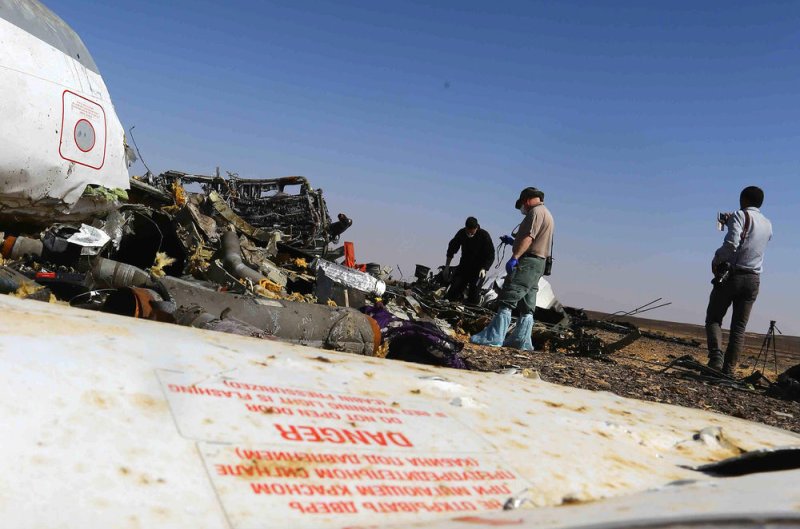1 of 4 | Russian investigators walk near wreckage of Metrojet Flight 9268 in Wadi el-Zolmat, a mountainous area in Egypt's Sinai Peninsula on November 1, 2015. The Russian plane was bound for St. Petersburg, Russia, carrying 224 passengers. Photo by Karem Ahmed/UPI |
License Photo
LONDON, Nov. 4 (UPI) -- There is physical evidence that suggests terrorists likely planted a bomb aboard a Russian jetliner that exploded in midair over Egypt last weekend, a U.S. official said Wednesday.
Metrojet Flight 9268, a chartered Airbus A-321 operated by Russian carrier Kogalymavia, crashed after taking off from the airport in the resort town of Sharm el-Sheikh on Saturday. All 224 people on board, who were headed for St. Petersburg, Russia, were killed.
An unnamed U.S. official told NBC News Wednesday that physical evidence exists that has American investigators believing an operative or sympathizer of the Islamic State militant group was responsible for smuggling the bomb on board.
U.S. investigators are looking into the possibility that a member of the ground crew at Sharm el-Sheikh may have aided in planting the explosive.
While the official said it's likely the plane was downed by a bomb, a mechanical failure remains a possibility.
Tuesday, U.S. officials said an infrared surveillance satellite detected a "flash or explosion" in the vicinity aircraft before the crash. A U.S. defense official, though, said the satellite saw no heat trail of a surface-to-air missile -- an indication that the explosive device may have already been on board the plane.
However, there may be other explanations for the infrared flash, such as an exploding engine or a fire.
Also Wednesday, a group claiming to be associated with the terror group claimed credit for the bombing on social media. Some officials, though, are skeptical of that claim.
Sharm el-Sheikh, which sits on the southern tip of the Sinai Peninsula, is a popular Egyptian town with local and foreign tourists, but officials have long said it's also a place frequented by various terror factions. Eighty eight people were killed and about 200 were wounded in a terrorist attack on the city in 2005, which was aimed at Egypt's tourism industry.
The cause of Flight 9268 remains under investigation by Egypt's Ministry of Civil Aviation, which has retrieved the jet's black boxes -- one of which, the cockpit voice recorder, was damaged.
"Consequently no further comment on the CVR can be made. Examination of parts on site is continuing," the ministry said.
Earlier Wednesday, the British government announced it was canceling flights to and from Sharm el-Sheikh, and dispatched a team of experts to Egypt to aid in the investigation:
We cannot say categorically why the Russian jet crashed. But as more information has come to light we have become concerned that the plane may well have been brought down by an explosive device. In light of this, and as a precautionary measure, we have decided that flights due to leave Sharm for the UK this evening will be delayed. That will allow time for a team of UK aviation experts, currently travelling to Sharm, to make an assessment of the security arrangements in place at the airport and to identify whether any further action is required. We expect this assessment to be completed tonight," the spokeswoman said. "In light of this, and as a precautionary measure, we have decided that flights due to leave Sharm for the UK this evening will be delayed."
Although a local Islamic State affiliate has claimed responsibility for the crash, some officials dismissed their claim, saying none of the militias on the Sinai Peninsula have the weapons to down the plane from its altitude.
A preliminary scan of the passenger manifest did not turn up any suspected terrorist operatives, U.S. officials said, and American workers are being advised to avoid Sharm el-Sheikh for the time being.
"We need to advise U.S. workers not to go to the Sinai," Pentagon spokesman Rear Adm. John Kirby said Wednesday.
Ed Adamczyk contributed to this report.















